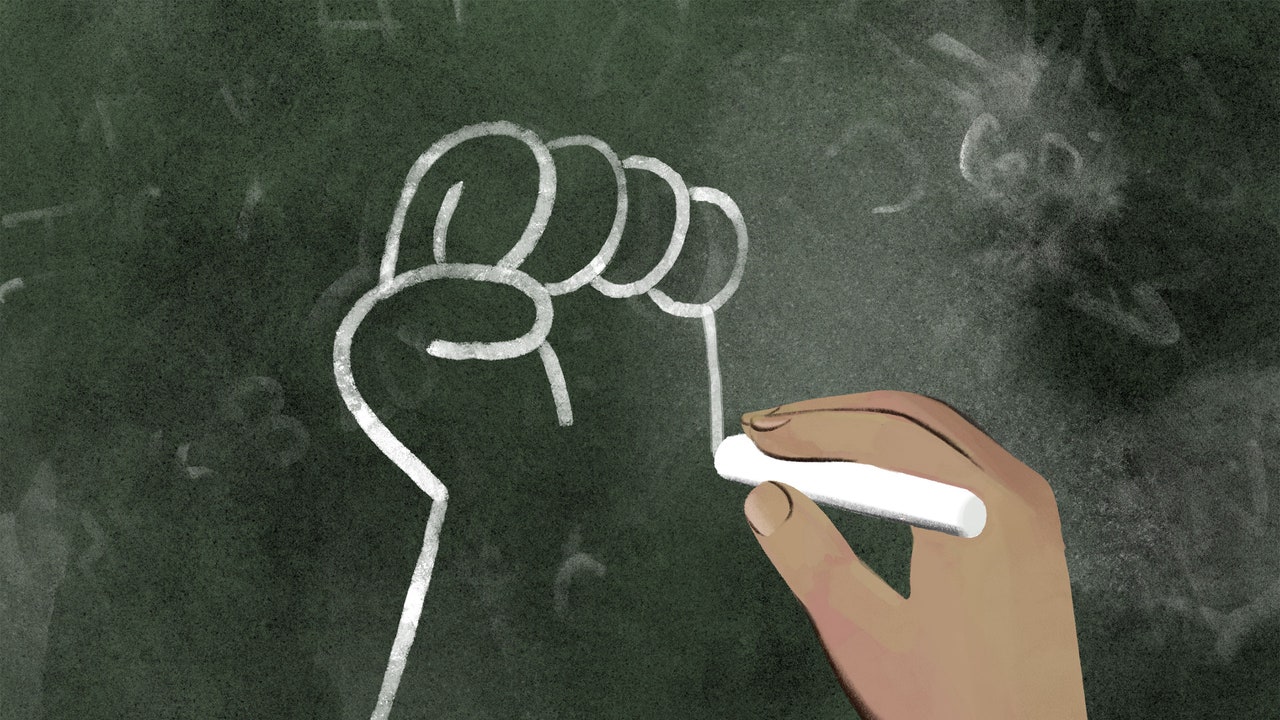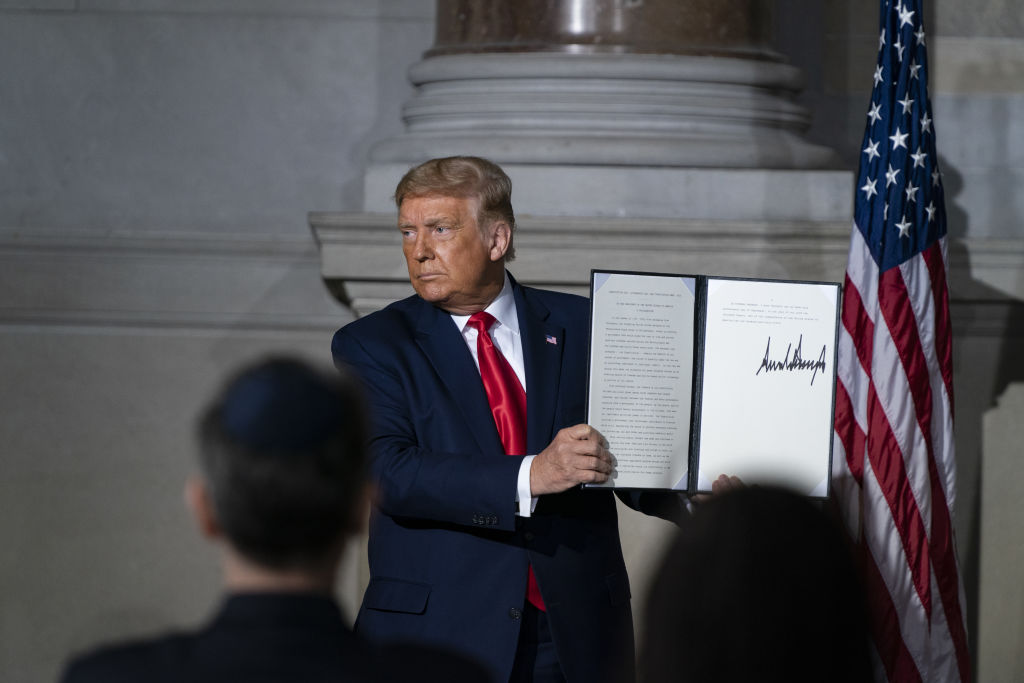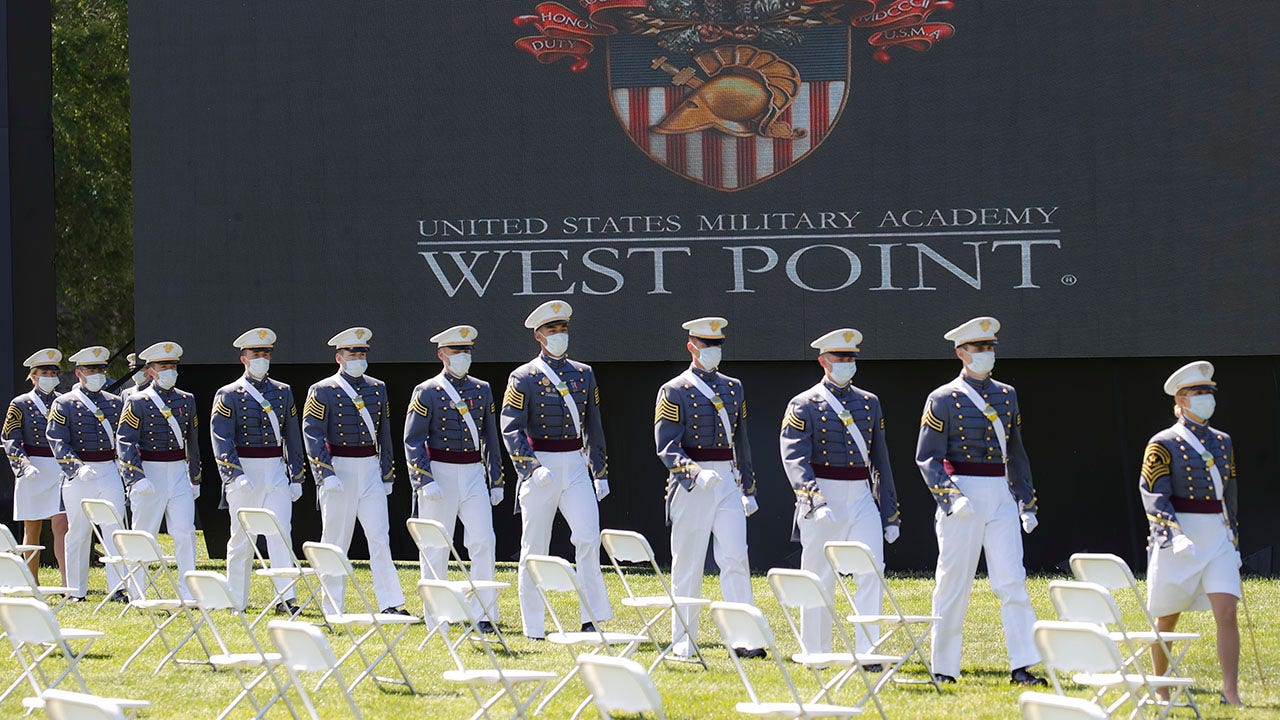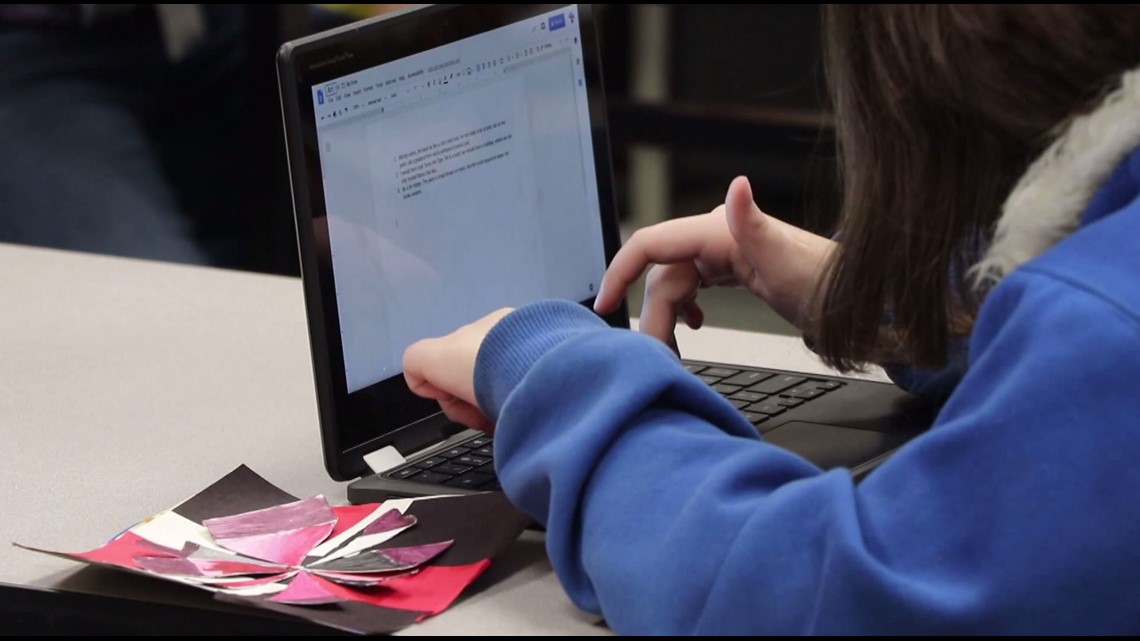‘Critical race theory’ becomes a flashpoint in US public schools
As Americans face a racial reckoning, a fierce political debate is emerging over how race is discussed in schools.
By Chris Moody
11 Jun 2021
As part of a backlash against campaigns to emphasize racism’s historical and ongoing effect on inequality in American life, Republican lawmakers across the United States are moving to restrict how race is discussed in public schools.
Legislatures in more than a dozen states have considered bills that would regulate how teachers teach about race-related issues in classrooms. Many aim to ban “critical race theory”, a school of thought that holds that major institutions in the US are inherently racist and constructed by their nature to perpetuate white supremacy.
Throughout the country, local school board meetings have been filled with parents voicing concerns. Fox News, a right-wing television network, has aired segments warning about critical race theory for weeks.
Debate is part of US’s race reckoning
The moves come at a time when the US continues to grapple with how to address racial inequalities, more than a year after protests and riots erupted throughout the country following the killing of George Floyd, an unarmed Black man, at the hands of a white police officer.
The reckoning has divided Americans over how best to examine forces in society that lead to inequalities based on race. It has forced Americans to take a critical look at their country that some would rather avoid.
“There is a desire for a good past and good ancestry. Americans have a hard time holding things together in a complex way. I don’t think we’re very good at being able to accept the good and the bad together as a part of our own heritage,” said Marie Griffith, a professor at Washington University and author of Making the World Over: Confronting Racism, Misogyny, and Xenophobia in U.S. History.
“We can learn about the very difficult and painful parts of our past and do better without developing self-hatred. Your children are not going to start hating you and hating all of your ancestors simply because they’re learning this history. It should be an honor to grapple with that history.”
Arkansas, Idaho, Tennessee, Florida and Oklahoma have already passed new laws that place restrictions on public school teaching related to race. Other states are considering similar rules.
Republicans: Critical race theory is divisive
Florida’s Republican governor, Ron Desantis, who signed a bill this week banning the teaching of critical race theory in public schools, said the new law would protect children from being taught that they are defined and restricted by race.
“I think it’s going to cause a lot of divisions,” Desantis said. “I think it’ll cause people to think of themselves more as a member of a particular race based on skin color, rather than based on the content of their character and based on their hard work and what they’re trying to accomplish in life.”
Tennessee’s law, which goes into effect July 1, bars instructors from teaching that “an individual, by virtue of the individual’s race or sex, is inherently privileged, racist, sexist, or oppressive, whether consciously or subconsciously.”
Tennessee Governor Bill Lee, a Republican, said it was important for schools to emphasize “American exceptionalism” instead of dwelling on topics that “inherently divide”.
The new laws raise alarming questions about academic freedom and the power of state governments to restrict having difficult – but important – conversations around race, said Adrienne Dixson, a professor at the University of Illinois who specializes in the intersection of race and education.
“It is unfortunate that politicians want to limit literally what we can know, what we can think and what we can talk about. That’s concerning,” Dixson told Al Jazeera. “It should be frightening for everyone, no matter what you think about race.”
The prim
Jonathan Butcher, an education policy scholar at the conservative Heritage Foundation, argues that critical race theory would perpetuate discriminatory attitudes instead of reducing them.
“It’s very different to say that these are individual acts that we condemn and to say that the American government or that public institutions are inherently racist,” Butcher told Al Jazeera.
“It robs children of the opportunity to understand that this American promise of opportunity for everyone regardless of the color of their skin and equality under the law is available to them.”
Dixson, however, said that critical race theory merely explores a truthful part of American life that has long existed.
“This isn’t history that critical race theory or people of color are making up. This is documented history. We know this factually. We’re reckoning with that history and ensuring we don’t replicate it,” Dixson said.
“Racism doesn’t have to be overt acts where someone is using racial epithets or there are explicit policies to restrict people of color. But maybe it could be ensconced in our policy in ways that we are unaware of because we’ve internalized certain rhetoric or beliefs about who is deserving and who isn’t.”
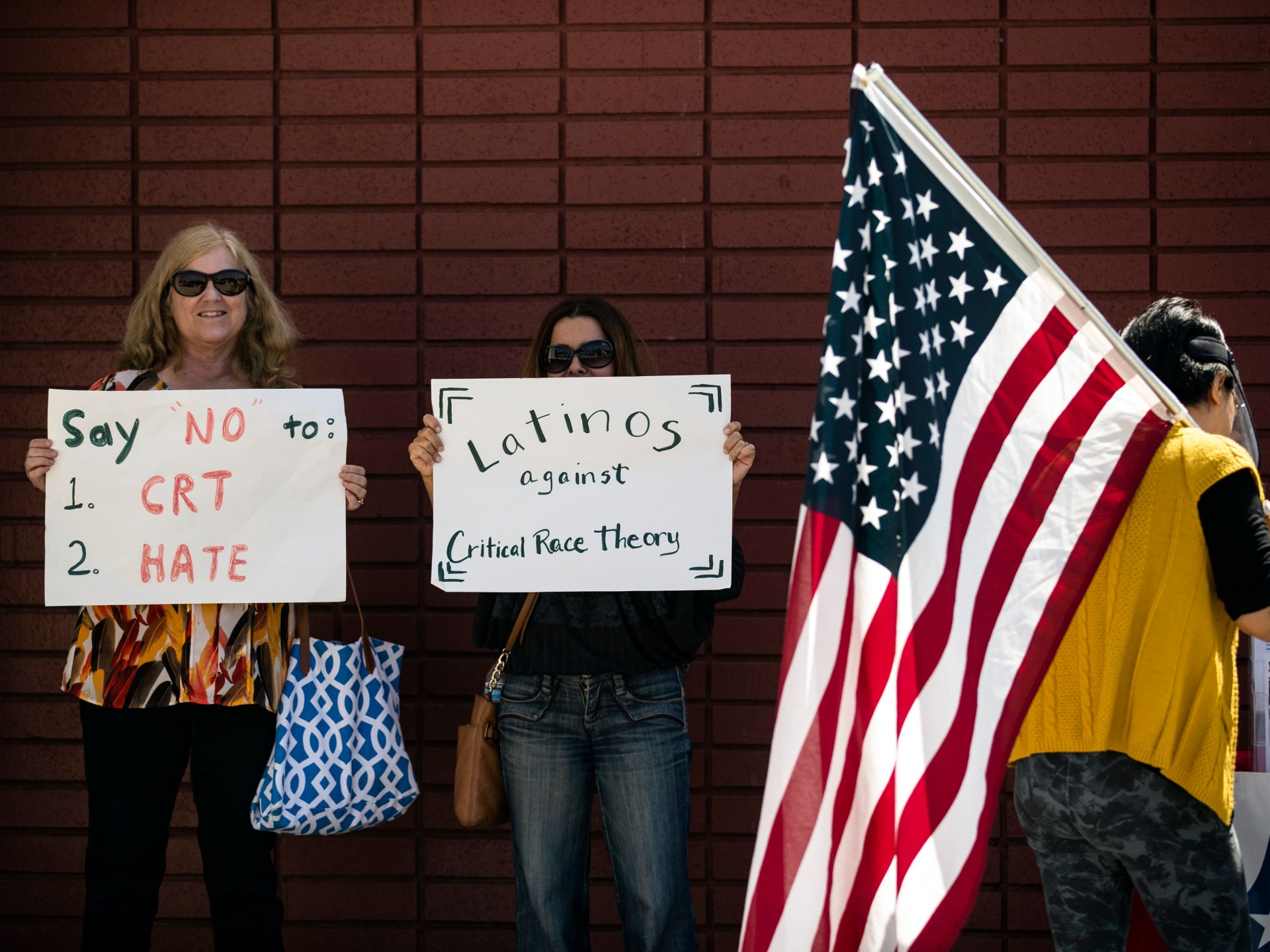
 www.aljazeera.com
www.aljazeera.com
As Americans face a racial reckoning, a fierce political debate is emerging over how race is discussed in schools.
By Chris Moody
11 Jun 2021
As part of a backlash against campaigns to emphasize racism’s historical and ongoing effect on inequality in American life, Republican lawmakers across the United States are moving to restrict how race is discussed in public schools.
Legislatures in more than a dozen states have considered bills that would regulate how teachers teach about race-related issues in classrooms. Many aim to ban “critical race theory”, a school of thought that holds that major institutions in the US are inherently racist and constructed by their nature to perpetuate white supremacy.
Throughout the country, local school board meetings have been filled with parents voicing concerns. Fox News, a right-wing television network, has aired segments warning about critical race theory for weeks.
Debate is part of US’s race reckoning
The moves come at a time when the US continues to grapple with how to address racial inequalities, more than a year after protests and riots erupted throughout the country following the killing of George Floyd, an unarmed Black man, at the hands of a white police officer.
The reckoning has divided Americans over how best to examine forces in society that lead to inequalities based on race. It has forced Americans to take a critical look at their country that some would rather avoid.
“There is a desire for a good past and good ancestry. Americans have a hard time holding things together in a complex way. I don’t think we’re very good at being able to accept the good and the bad together as a part of our own heritage,” said Marie Griffith, a professor at Washington University and author of Making the World Over: Confronting Racism, Misogyny, and Xenophobia in U.S. History.
“We can learn about the very difficult and painful parts of our past and do better without developing self-hatred. Your children are not going to start hating you and hating all of your ancestors simply because they’re learning this history. It should be an honor to grapple with that history.”
Arkansas, Idaho, Tennessee, Florida and Oklahoma have already passed new laws that place restrictions on public school teaching related to race. Other states are considering similar rules.
Republicans: Critical race theory is divisive
Florida’s Republican governor, Ron Desantis, who signed a bill this week banning the teaching of critical race theory in public schools, said the new law would protect children from being taught that they are defined and restricted by race.
“I think it’s going to cause a lot of divisions,” Desantis said. “I think it’ll cause people to think of themselves more as a member of a particular race based on skin color, rather than based on the content of their character and based on their hard work and what they’re trying to accomplish in life.”
Tennessee’s law, which goes into effect July 1, bars instructors from teaching that “an individual, by virtue of the individual’s race or sex, is inherently privileged, racist, sexist, or oppressive, whether consciously or subconsciously.”
Tennessee Governor Bill Lee, a Republican, said it was important for schools to emphasize “American exceptionalism” instead of dwelling on topics that “inherently divide”.
The new laws raise alarming questions about academic freedom and the power of state governments to restrict having difficult – but important – conversations around race, said Adrienne Dixson, a professor at the University of Illinois who specializes in the intersection of race and education.
“It is unfortunate that politicians want to limit literally what we can know, what we can think and what we can talk about. That’s concerning,” Dixson told Al Jazeera. “It should be frightening for everyone, no matter what you think about race.”
The prim
Jonathan Butcher, an education policy scholar at the conservative Heritage Foundation, argues that critical race theory would perpetuate discriminatory attitudes instead of reducing them.
“It’s very different to say that these are individual acts that we condemn and to say that the American government or that public institutions are inherently racist,” Butcher told Al Jazeera.
“It robs children of the opportunity to understand that this American promise of opportunity for everyone regardless of the color of their skin and equality under the law is available to them.”
Dixson, however, said that critical race theory merely explores a truthful part of American life that has long existed.
“This isn’t history that critical race theory or people of color are making up. This is documented history. We know this factually. We’re reckoning with that history and ensuring we don’t replicate it,” Dixson said.
“Racism doesn’t have to be overt acts where someone is using racial epithets or there are explicit policies to restrict people of color. But maybe it could be ensconced in our policy in ways that we are unaware of because we’ve internalized certain rhetoric or beliefs about who is deserving and who isn’t.”

‘Critical race theory’ becomes a flashpoint in US public schools
As Americans face a racial reckoning, a fierce political debate is emerging over how race is discussed in schools.


